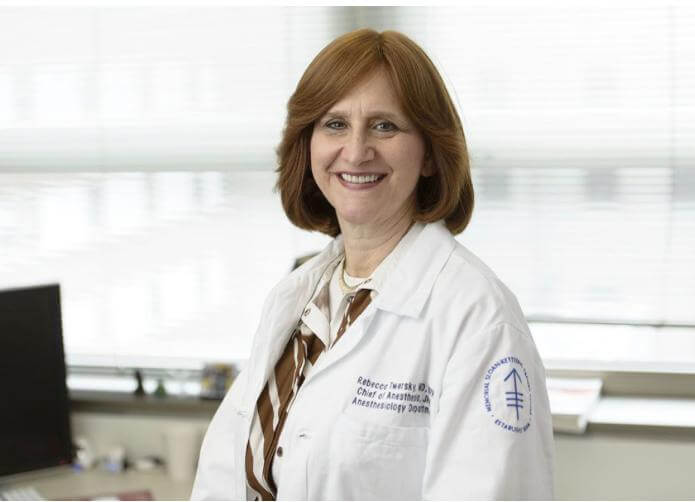
Remembering Dr. Rebecca Twersky: A Founding Physician of Ambulatory Anesthesia and Orthodox Jew
If you’ve ever thought that being an Orthodox Jew could hold you back in some way, please learn more about Dr. Rebecca Twersky. Sadly, Twersky passed away last month at the age of 67.
As a member of the renowned Twersky family — one of the largest Hasidic dynasties — she has greatness in her blood, but took the life and time she was given to new heights all on her own.
In fact, early on, she had to convince her family that being a doctor was the right profession for her. She grew up in Los Angeles in the ‘60s and ‘70s and went to an all-girls yeshiva. She was the third of four children, and said in an interview with the New York State Society of Anesthesiologists (NYSSA) that they were always known as the “rabbi’s children,” since there weren’t many Orthodox Jews there then.
She says she thrived at school in an all-girls environment — excelling academically along with her sister and getting involved with student government. In 12th grade, she started UCLA early as a high school senior while still completing regular high school studies and Jewish studies on top of that.
When her father met a “medical technologist,” he thought it could be a good career path, but Dr. Twersky dreamed of becoming a doctor. “There were no women doctors in our Orthodox community,” she shared in that interview. “…my parents, particularly my father, eventually came around to accept my career path when they saw what I had accomplished and how driven I was.”
Initially, she wanted to become an OBGYN, but once she was exposed to anesthesia in medical school, she was fascinated. As she began her third year of medical school — right after she got married to her husband, David Schreiber — she was doing a psychiatry rotation at Downstate Medical Center and had a patient receiving general anesthesia several times a week for a certain condition.
“During that time, I was tantalized by the breadth, depth and versatility of the specialty, and I signed up for a clinical anesthesiology elective followed by an anesthesiology research elective,” she shared in the same interview. “The rest is history.”
She loved that the field encompassed all medical disciplines in one. Once she was in, she was all in. She spearheaded the new field of ambulatory anesthesia in the ‘80s to the point that she wrote two textbooks in the field, established national guidelines for office-based anesthesia and surgery and had more than 75 peer-reviewed articles, plus many more that weren’t reviewed.
If you’re not familiar with what ambulatory anesthesia is, it’s basically outpatient anesthesia, or anesthesia that allows you to come in for a simple procedure and go home that same day, or within 24 hours. In the past, when you went under anesthesia it was a given that you would be admitted to the hospital for a couple of days. In order to do this, Twersky needed to research a good anesthetic that could facilitate the faster in and out time for patients.
“An ambulatory center is lower cost and has a higher patient satisfaction, but someone has to develop it,” Dr. Kara Barnett, a mentee, of Dr. Twerksy shares. Kara herself is a board-certified anesthesiologist and Director of Anesthesia Services at Memorial Sloan Kettering Monmouth. “There was no ambulatory anesthesia expert until she came along. She was a pioneer.” The two met when Barnett was an attending at Memorial Sloan Kettering and Twersky joined the hospital and took Barnett under her wing.
“She was very, very determined,” her husband, David Schreiber confirms. “When she put her mind to something, she always accomplished it and saw it to the end. She also did it without ever compromising her religion or standards. She was able to do things in a very natural way. That’s what was so remarkable about her.”
A Lasting Legacy
Her career was outstanding — she earned the Distinguished Service Award from the NYSSA in 2020 and served as the chief of anesthesia at Memorial Sloan Kettering’s Josie Robertson Surgery Center in New York City. Prior to that, she spent 30 years at SUNY Downstate where she was a professor of anesthesiology, medical director of the Ambulatory Surgery Care Unit and chair of the Institutional Review Board.
But she wasn’t just involved with her own accomplishments, she was highly invested in others. Dr. Barnett speaks about the amount of mentoring she did in her role. “She advocated for me to get the directorship I have now,” she explains.
The last time the two saw each other was in 2018 when they did a project together and Dr. Twersky came to the poster session where you present your research. It was clear she stood out in the simple yet profound way of supporting others. “She always made an effort to go to everyone’s presentation,” Dr. Barnett shares. “We didn’t get a lot of that in our department, we lacked mentorship…It was really nice to see that she was proud of me.”
When another colleague of Dr. Barnett’s passed her anesthesia boards, Dr. Twersky brought in a cake for her. When Dr. Barnett had her second son, Dr. Twersky sent matching outfits as a gift. “She was very, very busy but somehow always seemed to find the time,” Dr. Barnett says. “She was so kind and considerate, just a very special person.”
“She went out of her way to mentor the young faculty, especially women,” her husband says. “Many of them came to the shiva house to express their gratitude to her and what she had done for them — people of all different nationalities and races.”
In the article with the NYSSA, she cites “facilitating the promotion and advancement of colleagues,” as one of her proudest achievements.
She also became the go-to person for doctor referrals. She wouldn’t sleep unless those who needed help got it. It was to the extent that her husband didn’t even know how much work she was doing. “One woman came to the shiva and shared that 15 years ago, she called my wife because her father had pancreatic cancer. ‘The next day, your wife was at my front door to help and for the next 15 years, called once a week to make sure both he and then I had the best care,’” Screiber reveals. “I didn’t even know who this person was. Now, [since she passed,] I’m getting a lot of these types of calls. She was larger than life.”
Integrating Religion with Work
When you learn about someone like this, you realize how much you can actually get out of the 24 hours we have in a day if you truly and completely dedicate yourself to it. “This girl did not miss a mincha,” Schreiber shares, referring to the afternoon prayer service. “Even if she was running around without a head, she would always take ten minutes off, go back to her office and pray mincha. She never missed.”
Often, in her work, she had conferences or large meetings that lasted over the span of several days, including Shabbat. While she didn’t work on Shabbat or run meetings — and was strict about that — she would still stay in the location it was going on in so she could attend and be there immediately before and after.
Her husband explains they would often have these meetings in large penthouse rooms in hotels. They would have the meeting in one and then she would stay with her husband in another nearby. Often, they were on the 48th or 50th floor. “I said we’ll get security to push the elevator for us [on Shabbat],” he explains. “She said, ‘No, you’re walking up.’ We did it. We held hands, and walked all the way up.”
While she didn’t have to work on Shabbos or Jewish holidays, she was so invested in her patients that she would wait until the last one was discharged on a Friday afternoon and then walk three hours home if there wasn’t enough time to drive before sundown.
When one of the national organizations offered her their chairmanship, she had to decline, because the passing of the gavel would occur on the Sabbath. Even though she technically could go without breaking Shabbat in any way, she said that it’s not in the spirit of Shabbos, her husband explains. “For the first time in 25 years, they rescheduled it so it wouldn’t be on Shabbos,” he says. “She said they didn’t have to but they said, ‘No, we owe it to you.’” It was very natural the way she did it. She was able to accomplish in each area of her life without compromising the other.”
Whenever she had a free moment, she was learning Torah. She would listen to podcasts on her commute to work in and out of the city and even at the very end of her life, when she was on a ventilator, she was listening to one of her favorites, Rabbi Rosner. “She made sure that she did not waste a minute,” Schreiber explains.
She also simultaneously raised three children — two daughters and a son. Her son is a lawyer, like his father, her oldest daughter works for AIPAC in cyber security and has been for close to 20 years. Her youngest daughter works for another company at home while raising five children of her own.
“She was firm, disciplined, yet loving,” Schreiber shares. “She’s also a lot of fun.” She would plan ski and rafting trips for the family and would help her kids with their homework after work, even if they stayed up a bit later to have the time to do so when she got home. She did her best to be at every graduation and school play. “It’s hard,” Schreiber shares. “It wasn’t easy to balance motherhood, a spouse and a career, but she managed.”
She always prepared food at home and he also credits the housekeeper they’ve had for the past 42 years with a lot of help. No one can do it alone. Plus, Schreiber himself would also chip in with the cooking when need-be. “She was a great cook, she just didn’t have all that much time to do it,” he says. “She had all these elaborate recipe books. One time, she took sutures from the OR to stitch a veal recipe she was making!”
She offers advice in an article she was interviewed for in 2020 to other women who are seeking a path to leadership, but it’s wisdom that can be applied to the masses, in any area of life: “Do not let anything stand in the way of your passion to advance your career, and accept opportunities that will enhance your leadership experience. Identify a mentor(s) and engage in professional networking outside your clinical practice. “No” is not an answer!”
“She was an incredible human being,” Schreiber says. “The more I speak about her, the more I realize how much I miss her.”
If you found this content meaningful and want to help further our mission through our Keter, Makom, and Tikun branches, please consider becoming a Change Maker today.








2 comments
Sort by
BDE. knew her from childhood. tried to help her apply to med school , when the family was still not warm to the idea . was always a great character , back in the days when LA frum community was small….
Thank you